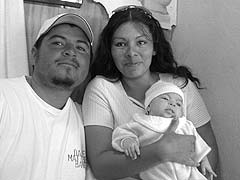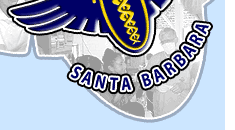|
Aeromedicos'
roots go back to 1974, although we didn't incorporate as a California-registered
501(c) 3 under the name of Aeromedicos until 1985. Now, in 2002,
more than 100 volunteers, including medical doctors, dentists,
pharmacists, chiropractors, nurses, optometrists, audiologists,
technicians, medical students, pilots, construction workers,
and general volunteers, regularly provide quality medical and
dental services to the community of Cadeje, in Baja California
Sur, Mexico.
In the beginning, Aeromedicos served the Yaqui Indians in Sonora,
Mexico. For nearly 20 years we offered free medical and dental
care, as well as free medications, to the seven Yaqui villages
in that area, which, at the time, had no medical services.
With our own funds and local labor, we created a clinic that
allowed
us to treat 400-500 patients every month between October and
June.
The Yaqui had a long history of conflict with the ruling party
in Mexico and unfortunately, in 1995, our permit to operate in
Sonora was not renewed by the
Mexican government. We then moved our operation to Baja to serve the communities
of Mulege and Cadeje.
 Since 1995, Aeromedicos has served the people of Cadeje, a
small community 600 miles south of San Diego, and the residents
of the small fishing villages and
ranchos of this remote desert area. About 30 volunteers fly in private planes
every month from October through June to conduct free medical, dental, audiology,
and optometry clinics. Before Aeromedicos arrived, Cadeje did not have any
medical services. Now families from all over the area travel
by various means-from foot
to horseback to beat-up pick-up truck-to receive free medical and dental
treatment. On clinic day, we typically treat around 100 patients
(half of which are children)
who would otherwise receive no medical care at all. Although this is a smaller
area from which to draw patients, the need is even greater here than in Sonora,
where a Mexican clinic has been established. (Aeromedicos used to conduct
the same four clinics in the town of Mulege, on the eastern side
of the Baja peninsula,
as well, but this community now has ongoing local medical care. Aeromedicos
still conducts audiology and optometry clinics in Muleje, however.) Since 1995, Aeromedicos has served the people of Cadeje, a
small community 600 miles south of San Diego, and the residents
of the small fishing villages and
ranchos of this remote desert area. About 30 volunteers fly in private planes
every month from October through June to conduct free medical, dental, audiology,
and optometry clinics. Before Aeromedicos arrived, Cadeje did not have any
medical services. Now families from all over the area travel
by various means-from foot
to horseback to beat-up pick-up truck-to receive free medical and dental
treatment. On clinic day, we typically treat around 100 patients
(half of which are children)
who would otherwise receive no medical care at all. Although this is a smaller
area from which to draw patients, the need is even greater here than in Sonora,
where a Mexican clinic has been established. (Aeromedicos used to conduct
the same four clinics in the town of Mulege, on the eastern side
of the Baja peninsula,
as well, but this community now has ongoing local medical care. Aeromedicos
still conducts audiology and optometry clinics in Muleje, however.)
 The cost of flying to and from our clinic is shared by the
volunteers in each airplane, who also pay for their own lodging,
food, and ground transportation
while in Mexico, in addition to donating their services. We take pride in
the fact that the majority of the Aeromedicos funding comes from
the volunteer members
themselves. The cost of flying to and from our clinic is shared by the
volunteers in each airplane, who also pay for their own lodging,
food, and ground transportation
while in Mexico, in addition to donating their services. We take pride in
the fact that the majority of the Aeromedicos funding comes from
the volunteer members
themselves.
At both Mulege and Cadeje, we were given buildings that were
little more than shells. From them we collaborated with the local
residents to create clinics.
We provided the money and materials, and they provided much of the labor.
By western standards these clinics are primitive, but they serve
our needs for treating
patients. In Cadeje we tripled the size of the building, adding a dental
clinic and pharmacy. We installed generators, rewired the building,
and added two bathrooms
with flush toilets-all at no expense to the population.
 We maintain a well-stocked pharmacy that includes hearing aids
and eyeglasses, plus a wide variety of medications to treat everything
from coughs and colds
to Parkinson's and end-stage heart disease. All medicine and equipment
used by Aeromedicos are donated or purchased with contributions.
While medicines
are
cheaper in Mexico, we cannot rely on their delivery, so we purchase the
much-needed drugs in the U.S. and take them with us on each trip.
In Cadeje, itinerant
doctors (fourth year medical students are required to do a two-year residency
in rural
areas of Mexico) also use these medicines to treat patients who are unable
to come to our clinic or who need them between our visits. We maintain a well-stocked pharmacy that includes hearing aids
and eyeglasses, plus a wide variety of medications to treat everything
from coughs and colds
to Parkinson's and end-stage heart disease. All medicine and equipment
used by Aeromedicos are donated or purchased with contributions.
While medicines
are
cheaper in Mexico, we cannot rely on their delivery, so we purchase the
much-needed drugs in the U.S. and take them with us on each trip.
In Cadeje, itinerant
doctors (fourth year medical students are required to do a two-year residency
in rural
areas of Mexico) also use these medicines to treat patients who are unable
to come to our clinic or who need them between our visits.
Additionally, we have trained a young woman in Cadeje to act
as a nurse in our absence. She has the keys to the clinic so
that she can dispense
basic
medications
and open it for the traveling doctors to use. We hope to increase her
education in the years to come so she can be of even greater
assistance to her neighbors.
|


